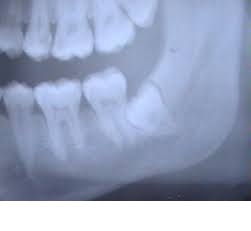Summer is often the time when people make decisions about wisdom teeth removal, particularly college students and those who are on an academic calendar. So, now is a perfect opportunity for a mini-lesson on wisdom teeth.
The so-called wisdom teeth are the final set of molars that develop in young adults. They begin to erupt and mature in people’s late teens or early twenties, hence the name wisdom teeth, although we know plenty of people in this age group who have not hit their peak of wisdom.
 For lots of people, there is plenty of room in their mouths and the wisdom teeth can fit right in and become part of their dental landscape. But most people’s mouths just don’t have enough room to accommodate these teeth. As a result, the teeth either are coming in misaligned or are completely impacted.
For lots of people, there is plenty of room in their mouths and the wisdom teeth can fit right in and become part of their dental landscape. But most people’s mouths just don’t have enough room to accommodate these teeth. As a result, the teeth either are coming in misaligned or are completely impacted.
Misaligned wisdom teeth begun to erupt at the gum line at an odd angle, either twisted or angled, or the teeth could possibly even be completely horizontal. These misaligned teeth do not aid in eating and are detrimental to the alignment of the other teeth, causing crowding, possibly damaging adjacent teeth or even abutting the jawbone or any of the nearby nerves, which could cause pain and infection.
In an even more serious case, wisdom teeth can be not just misaligned, but completely impacted. Impacted wisdom teeth may not even erupt beyond the gum line, but often lie completely beside the jawbone or within the gum tissue. A partially impacted wisdom tooth could create a hole in the gum, which becomes an entry point for bacteria and infection. Partially erupted teeth don’t aid eating, but become a magnet for tooth decay and gum disease. In short, they are not beneficial at all.
Extracting Wisdom Teeth
If you and the dentist decide that your wisdom teeth need to be removed, a plan for extracting them will be developed. Often, a referral to an oral surgeon will be made. We have very good relationships with extremely skilled oral surgeons, known for their gentleness and their capability.
If your wisdom teeth have already fully erupted, their extraction is a fairly simple affair, akin to taking out any other teeth and it is possible to do without an oral surgeon.
If your wisdom teeth are partially or fully impacted, their removal requires incisions and stitches and is a more complex procedure.
For any extraction, local anesthesia will be administered to the area. Depending on your anxiety and pain tolerance as well as the complexity of the procedure, other pain-relief measures will be used including general anesthesia and anti-anxiety medications, either given orally or intravenously.
What Do I Do if my Wisdom Teeth Hurt Right Now?
There are several symptoms of wisdom teeth problems. You may be experiencing pain around the area of an erupting wisdom tooth, or even notice a cyst on the gum near where the tooth should be or a flap of skin above the erupting tooth. You could have pain in the jaw, sensitivity in the area when eating or drinking or what feels like a constant ache that will not go away.
Obviously, don’t suffer in silence! Please call us right away so we can evaluate the nature of your mouth pain. In the meantime, you can try some of these at home remedies to give yourself some immediate short-term relief:
- Place a cold pack on your face near the pain for about 15-20 minutes at a time.
- Do not put heat on your face (heat causes swelling).
- You may under certain circumstances take over-the-counter pain medications (but not aspirin for children) like ibuprofen or naproxen.
- You can rinse your mouth out every few hours with saltwater.